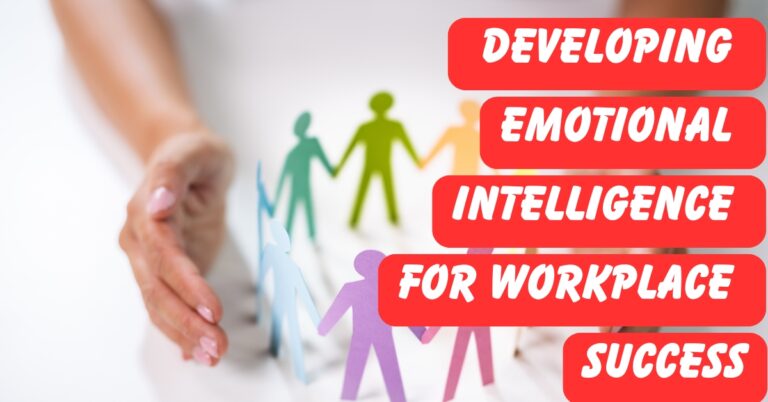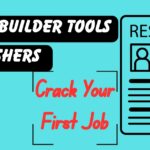Hey! My name is Ashwini Mishra, Career Coach at JobDosti. com
Follow this blog if you want to learn at home and enhance your profile. Having had the opportunity to work along with professionals, freshers and job switchers, I’ve realised that one skill just stands above the rest – emotional intelligence. Today, I want to show you why cultivating emotional intelligence for workplace success can transform how you work, lead, and grow.
So whether you want to help with work relationships, leading a team, or just become more confident in general, you’re in the right place.
What Is Emotional Intelligence (EQ)?
Emotional Intelligence aka EQ is the ability to understand, manage, and express your own emotions, as well as recognize how to react to emotions of others. Whereas IQ is more about logic and reasoning, EQ is what helps you connect with people, manage stress, navigate conflict and build trust.
Psychologist and author Daniel Goleman identifies five elements that are part and parcel of emotional intelligence:
- Self-awareness – Understanding your emotions
- Self-Regulation – Ability to manage your reactions
- Motivation – Staying driven
- Empathy – Living in other people’s emotions
- Social skills — Developing meaningful relationships
So break these down and build each of them.
Why Emotional Intelligence Matters at Work
I’ve known a lot of people with great technical skills who grew frustrated because they weren’t able to move ahead in their careers. Why? Because of their absolute zero on soft skills that only come from possessing some degree of emotional intelligence. Here’s why EQ is essential to your workplace success:
- It aids to deal well with anxiety-provoking scenarios
- It enhances cooperation and teamwork
- It develops you as a better communicator
- It teaches you how to resolve conflicts peacefully
- It should make you a better leader and decision maker
In today’s workplaces, emotional intelligence is as crucial as job skills (and competence), particularly for leadership positions.
Five Action Areas for Improving Emotional Intelligence at Work
1. Self-Awareness: Understanding Who You Are
Self-awareness is knowing that your feelings are not the truth, but still summon the honesty to feel what you feel and understanding how those emotions reflect in your actions. It’s one of the first steps in helping get better relationships at work encouraged.
How to improve it:
- Give yourself time each day to reflect on your thoughts and feel your feelings
- Have your colleagues give you feedback
- Maintain a journal to note what you are feeling and how you react
Why it matters:
If you know your own feelings, your feelings won’t surprise you or overcome you. You will perform better under pressure.
2. Self-Regulation: Keep Your Emotions in Check
It’s about controlling emotional impulses. However getting angry, frustrated, or panicked can hurt your image and relationships at work.
How to improve it:
- Practice breathing or mindfulness exercises
- Take a moment to think before answering in a fight
- Embrace Mistakes and Keep Moving Forward
Why it matters:
High-EQ people maintain their cool during difficult situations, and that composure inspires trust among others.
3. Motivation: Keep Yourself Inspired and Fun
Determination is the power that helps you overcome something even when you don’t want to. It also means having fun with what you do instead of just doing it for money or for the reward.
How to improve it:
- Formulate goals for yourself and monitor your progress
- For you focused on learning not just performance
- Celebrate small wins
Why it matters:
Such a motivated person will keep spreading positivity in the team and put energy into everything he does.
4. Empathy: Even if you don’t want to, respect others
Empathy is the practice of walking a mile in someone else’s shoes. It’s not about necessarily agreeing with them—it’s about understanding them.
How to improve it:
- Listen more than you speak
- Body language and tone matter.
- Avoid quick judgments
Why it matters:
Empathy fosters trust, promotes teamwork, and aid in peacefully resolving conflicts. It’s a key skill for managers and team leads.
5. Social Skills: Develop Healthy Relationships
This is about the way you behave with people. People who are socially adept understand how to connect, communicate and persuade people without being aggressive.
How to improve it:
Practice active listening
Be aware of the limits of your expertise
Be Real about Supporting Your Team Members
Why it matters:
That’s where strong social skills come in, allowing you to build networks, manage clients, run meetings and motivate people.
Ways To Develop Emotional Intelligence in Practical Life
I think emotional intelligence is like building muscle. You’re not going to wake up better, but each day moving in the right direction is permanent change.
Here’s how you can start:
- Self-assessment test: Websites offer free EQ tests. To make you realize, what you are good and which areas you need to work on.
- Practice mindfulness: Take a few minutes every day and simply breathe and notice what thoughts come up.
- Role-play scenarios: You can show your partner how you’d handle challenging conversations to help them practice doing so.
- Recognize social and emotional signs: Watch how people behave in meetings or when stressed.
- Try not to take feedback personally: Learn from feedback. Utilize this to develop your self-awareness and be better at your behavior.
Why High Emotional Intelligence Is Beneficial in the Workplace
- Improved cooperating – You collaborate with others, even when there are disagreements.
- Faster promotions — Managers remember who stayed cool while solving problems.
- Better leadership – EQ allows you to lead teams, delegate tasks and maintain morale.
- Better Decision Making – You don’t allow fear or anger to influence your decisions.
- Reduced stress – You handle stressors more effectively and recover more quickly from challenges.
In my experience, those who gain EQ are not only more successful in their jobs, but also more satisfied and more confident. Know more!
FAQs
Is emotional intelligence more important than IQ in the workplace?
Yes, in many jobs. IQ might help you land the job but now, you need EQ to hold onto it and move up through it. Managers want emotionally smart people who can work with others.
Emotional intelligence: Is it a learned ability or an innate one?
You can absolutely learn it. Just like any other skill, EQ can be developed with practice, self-awareness and reflection.
How can remote work increase emotional intelligence?
Connect regularly through video calls, listen to what people are saying, be empathetic in conversation, let people have their say, and allow space for quiet. And it matters even more remotely because tone and emotions are more difficult to read.
How in a way can emotional intelligence assist you in interviewing?
Definitely. The fact that you are able to think clearly, that you are able to be calm under pressure and genuinely engage with the interviewers will certainly resonate.
Does emotional intelligence matter for freshers and entry-level positions?
Yes! Even if you are new, your attitude, communication and teamwork skills will help you stand out. They show you’re ready to evolve.
Conclusion: A Dissimilar Outlook, A Single, Highly Effective Asset
Emotional intelligence is what helps everyone — from team members to CEOs — succeed. As a career coach, I’ve experienced how high EQ individuals receive better feedback, create more cohesive teams and navigate transitions confidently.
As a fresher, EQ plays a vital role in creating a good first impression. For managers, it strengthens teams. For entrepreneurs, it results in loyal clients and productive teams. Workplace success through emotional intelligence is a good step at any stage of your career.
So, start small. Take time to understand your emotions, listen actively, stay calm in pressure and keep learning. Over time, you’ll see how your relationships, reputation and career start to change for the better.
Read these also.


